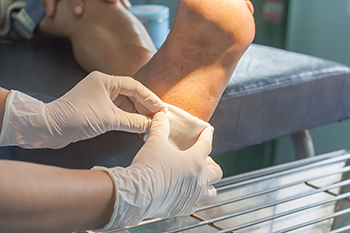
Foot wounds can lead to serious complications if not cared for properly. A podiatrist is a trained specialist who takes specific steps to clean and treat a foot wound to ensure it heals effectively and reduces the risk of infection. After the hands are washed, the wound is assessed for any foreign debris, such as dirt or stones. Using sterile gauze or a clean cloth, the wound is cleaned with mild soap and water, and caution is taken to not scrub the affected area. This is followed by applying a suitable antiseptic solution to disinfect the wound. Once the area is properly cleaned and disinfected, the wound is covered with a sterile bandage to create a protective barrier, promoting faster healing. If you have sustained a foot wound, it is suggested to seek professional care from a podiatrist to ensure the wound is treated appropriately and to receive guidance on the best care practices for your specific injury.
Wound care is an important part in dealing with diabetes. If you have diabetes and a foot wound or would like more information about wound care for diabetics, consult with Priyanka Mude, DPM from North Canton Podiatry. Our doctor will assess your condition and provide you with quality foot and ankle treatment.
What Is Wound Care?
Wound care is the practice of taking proper care of a wound. This can range from the smallest to the largest of wounds. While everyone can benefit from proper wound care, it is much more important for diabetics. Diabetics often suffer from poor blood circulation which causes wounds to heal much slower than they would in a non-diabetic.
What Is the Importance of Wound Care?
While it may not seem apparent with small ulcers on the foot, for diabetics, any size ulcer can become infected. Diabetics often also suffer from neuropathy, or nerve loss. This means they might not even feel when they have an ulcer on their foot. If the wound becomes severely infected, amputation may be necessary. Therefore, it is of the upmost importance to properly care for any and all foot wounds.
How to Care for Wounds
The best way to care for foot wounds is to prevent them. For diabetics, this means daily inspections of the feet for any signs of abnormalities or ulcers. It is also recommended to see a podiatrist several times a year for a foot inspection. If you do have an ulcer, run the wound under water to clear dirt from the wound; then apply antibiotic ointment to the wound and cover with a bandage. Bandages should be changed daily and keeping pressure off the wound is smart. It is advised to see a podiatrist, who can keep an eye on it.
If you have any questions, please feel free to contact our office located in North Canton, Ohio . We offer the newest diagnostic and treatment technologies for all your foot care needs.
